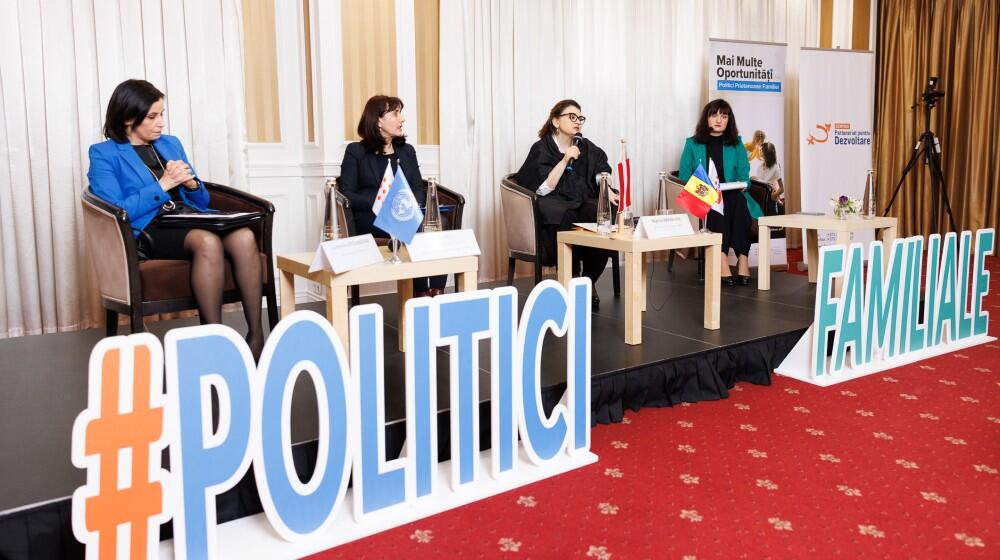Extending the creches services as part of family-friendly policies will support parents to have the desired number of children and to achieve their professional and personal goals. These are the conclusions of the public debate on Family Policies for the Desired Fertility: More Nurseries to Support Parents, carried out by the UN Population Fund Moldova (UNFPA), together with Center Partnership for Development (CPD).
The National Nursery Fund study was presented during the event as a solution for extending public nursery services. As a background information, in 2020 on average only 11% of the total number of children under the age of three were enrolled in early education institutions.
‘UNFPA, through the Demographic Resilience Programme, aims to support the Government of the Republic of Moldova in responding to the current demographic challenges, offering solutions so that families have the desired number of children. Gender-responsive family policies providing for family-friendly workplaces and nursery services accessible to under-three children are major components in this regard. These measures would help men and women reconcile family and professional life, without having to make sacrifices for this‘, said Nigina Abaszada, UNFPA Resident Representative.
According to National Bureau of Statistics data, in 2020, almost all women with children under the age of three were unemployed. The Generations and Gender Study (GGS) data show that in the Republic of Moldova more than half of the population believes the perfect number of children in a family is at least three, while in reality they have less than two.
The National Nursery Fund study, carried out by CPD, indicates that in order to create more nursery services and thus encourage the desired fertility, central authorities need to allocate more financial resources. However, there is no public budget line dedicated to nurseries, as they are included in the budget line for kindergartens.
Aliona Crețu, Head of the Demographic Policies Service of the Ministry of Labour and Social Protection, stated: ‘The Ministry of Labour intends to implement a set of measures, such as making paternal leave more flexible and extending care services for children, which are meant to contribute to achieving the desired fertility and to the wellbeing of families in our country’.
Marina Morozova, MP in the Parliament of the Republic of Moldova, reiterated that the Legislative stands ready to support the promotion of family-friendly policies.
‘Our role is to come up with proposals and solutions so that women can easily go back to work’, said the MP.
According to the CPD experts, creating the National Nursery Fund is an efficient response that will allow redirecting resources at the request of local public authorities in order to open nurseries in the localities where they are needed. In this regard, the experts foresee that investments will amount to at least EUR 15 million and recommend using the experience of the Moldova Social Investment Fund. Once nursery services are created and extended, 30% of under-three children could go to nurseries by 2026. This is possible if transfers from the state budget for early education are also increased by approximately 10% to cover maintenance costs.
‘Nursery services are a state priority, but besides setting up the infrastructure and investing in equipment, we also need to take into account how they will be institutionalised, regulated and how the sustainability of early education institutions will be ensured’, mentioned Ana Mardare, State Secretary for Regional Development, Ministry of Infrastructure and Regional Development.
Experts, representatives of central and local public authorities, civil society, as well as the representatives of UN Women, Dominika Stojanovka and of UNICEF Moldova, Maha Damaj, participated in the event.
This is a first public event marking the start of the public consultations on the need to create a National Nursery Fund and to prioritise public policies meant to contribute to balancing the family and professional life. The consultations are part of the UNFPA Demographic Resilience Programme, which aims to support the Republic of Moldova and other countries in the region to draft demographic policies based on people’s needs in order to respond to the challenges related to the decrease in population, to strengthen human resources and to define a prosperous future for each person.
The event was carried out as part of the Expanding Choices: Gender-Responsive Family Policies in the Western Balkans and Moldova regional project, implemented by the UN Population Fund, with the financial support of the Austrian Development Agency, in partnership with the Ministry of Labour and Social Protection.

